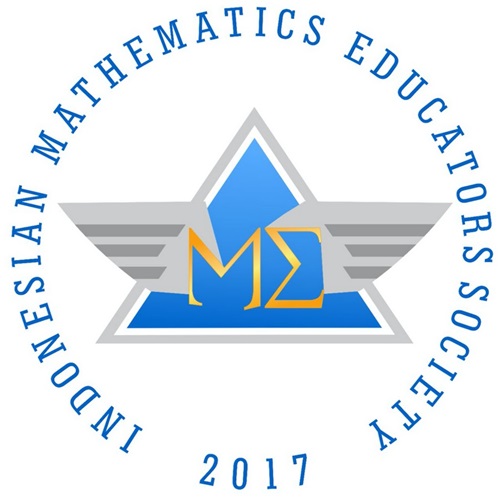Study of Learning Obstacles on the Topic of Perimeter of a Quadrilateral Viewed from Mathematical Literacy PISA 2021
DOI:
https://doi.org/10.22437/edumatica.v12i01.15631Keywords:
didactical design research, geometry, learning obstacle, quadrilateralAbstract
This research aims to obtain the learning obstacle on the topic of rectangular circumference in terms of Mathematical literacy PISA 2021. This research method is qualitative with a DDR (Didactical Design Research) approach, only at the learning obstacle study stage. Instruments for studying learning obstacles are designed based on PISA 2021 Mathematical literacy. Students' ability to conceptualize the perimeter of a quadrilateral will greatly influence subsequent learning, especially for solving the next topic problem. The participants of this study were six students in one of the private junior high schools in the city of Bandung. Participant 1 (P1) is a class VIII student, the other five participants (P1, P2, P3, P4, P5) are class IX students. The collection technique is done through tests, interviews, and documentation. Based on the study results, it was concluded that there were still some students who did not understand the concept of the perimeter of a quadrilateral in terms of mathematical literacy by PISA 2021. It was known that there were three learning obstacles, namely the connection of the concept of the perimeter of a rectangle with everyday life the ability of students to conceptualize the perimeter of a rectangle related to everyday problems. Days, and Use the formula for the perimeter of a quadrilateral.
Downloads
References
Aisyah, A. S., Riyadi, R., & Subanti, S. (2021). Description of the Difficulty Of Students’ Mathematics Problem Solving Assessed from Adversity Quotient (AQ). AKSIOMA: Jurnal Program Studi Pendidikan Matematika, 10(2), 1161. https://doi.org/10.24127/ajpm.v10i2.3663
Dedy, E., & Sumiaty, E. (2017). Desain Didaktis Bahan Ajar Matematika SMP Berbasis Learning Obstacle dan Learning Trajectory. Jurnal Review Pembelajaran Matematika, 2(1), 69-80. https://doi.org/10.15642/jrpm.2017.2.1.69-80
Diana, L., Vitaloka, T., & Wulandari, F. (2019). Learning Obstacle Siswa Terhadap Konsep Geometri SMP. Prosiding Seminar, (1), 501-515. Retrieved from http://fkip-unswagati.ac.id/ejournal/index.php/snpm/article/view/865
Fauzi, I., & Suryadi, D. (2020). The Analysis of Students’ Learning Obstacles on the Fraction Addition Material for Five Graders of Elementary Schools. Al Ibtida: Jurnal Pendidikan Guru MI, 7(1), 33. https://doi.org/10.24235/al.ibtida.snj.v7i1.6020
Harianti, R. (2016). Pola Asuh Orangtua dan Lingkungan Pembelajaran Terhadap Motivasi Belajar Siswa. Curricula, 2(2), 20-30. https://doi.org/10.22216/JCC.v2i2.983
Istiqomah, D. N. (2015). Learning Obstacles Terkait Kemampuan Problem Solving pada Konsep Fungsi Matematika SMP. Seminar Nasional Matematika Dan Pendidikan Matematika, 407-412.
Linda, L., Bernard, M., & Fitriani, N. (2020). Analisis Kesulitan Siswa SMP Kelas VIII pada Materi Segiempat dan Segitiga Berdasarkan Tahapan Berpikir Van Hiele. Journal of Medives : Journal of Mathematics Education IKIP Veteran Semarang, 4(2), 233. https://doi.org/10.31331/medivesveteran.v4i2.1066
Luritawaty, I. P. (2018). Pembelajaran Take and Give dalam Upaya Mengembangkan Kemampuan Pemahaman Konsep Matematis. Mosharafa: Jurnal Pendidikan Matematika, 7(2), 179-188. https://doi.org/10.31980/mosharafa.v7i2.27
Masjaya, & Wardono. (2018). Pentingnya Kemampuan Literasi Matematika untuk Menumbuhkan Kemampuan Koneksi Matematika dalam Meningatkan SDM. PRISMA, Prosiding Seminar Nasional Matematika, 1, 568-574.
Mawaddah, S., & Maryanti, R. (2016). Kemampuan Pemahaman Konsep Matematis Siswa SMP dalam Pembelajaran Menggunakan Model Penemuan Terbimbing (Discovery Learning). EDU-MAT: Jurnal Pendidikan Matematika, 4(1), 76-85. https://doi.org/10.20527/edumat.v4i1.2292
Organization for Economic Cooperation and Development. (2021). OECD Member Countries and Associates Decided to Postpone the PISA 2021 Assessment to 2022 to Reflect Post-Covid Difficulties. This Draft Vision Was Created Before the Crisis. The Final Version Will Reflect the New Name of the Cycle “PISA 2022,” 95. Retrieved from https://www.oecd.org/pisa/sitedocument/PISA-2021-mathematics-framework.pdf
Rismawati, Y., Nurlitasari, L., Kadarisma, G., & Rohaeti, E. E. (2018). Analisis Karakteristik Learning Obstacle Siswa SMP dalam Menyelesaikan Soal Bangun Datar. JPMI (Jurnal Pembelajaran Matematika Inovatif), 1(2), 99. https://doi.org/10.22460/jpmi.v1i2.p99-106
Rohimah, S. M. (2017). Analisis Learning Obstacles pada Materi Persamaan dan Pertidaksamaan Linear Satu Variabel. Jurnal Penelitian Dan Pembelajaran Matematika, 10(1). https://doi.org/10.30870/jppm.v10i1.1293
Sari, A. R., & Aripin, U. (2018). Analisis Kesalahan Siswa dalam Menyelesaikan Soal Cerita Bangun Datar Segiempat Ditinjau dari Kemampuan Pemecahan Masalah Matematik untuk Siswa Kelas VII. JPMI (Jurnal Pembelajaran Matematika Inovatif), 1(6), 1135. https://doi.org/10.22460/jpmi.v1i6.p1135-1142
Sari, P. W., Fuadiah, N. F., & Jayanti, J. (2019). Analisis Learning Obstacle Materi Segitiga pada Siswa SMP Kelas VII. Indiktika : Jurnal Inovasi Pendidikan Matematika, 2(1), 21. https://doi.org/10.31851/indiktika.v2i1.3394
Sari, R. R., & Roesdiana, L. (2020). Analisis Learning Obstacle Siswa SMP pada Materi Segiempat dan Segitiga. Prosiding Sesiomadika, 779-786. Retrieved from https://journal.unsika.ac.id/index.php/sesiomadika/article/view/2839
WS, H., Taufina, Chandra, & Anita, Y. (2018). Literasi Matematis Dalam Pembelajaran Berbasis Masalah. Jurnal Pendidikan, 1(1), 167. https://doi.org/10.31219/osf.io/538q2
Yanti, N., Septiati, E., & Fuadiah, N. F. (2020). Analisis Learning Obstacle Pembelajaran Luas Belah Ketupat untuk Kelas VII SMP. AKSIOMA : Jurnal Matematika Dan Pendidikan Matematika, 11(1), 53-62. https://doi.org/10.26877/aks.v11i1.4953
Yusuf, Y., Titat, N., & Yuliawati, T. (2017). Analisis Hambatan Belajar (Learning Obstacle) Siswa SMP pada Materi Statistika. AKSIOMA, 8(1), 76. https://doi.org/10.26877/aks.v8i1.1509
Downloads
Published
How to Cite
Issue
Section
License
Copyright (c) 2022 Deka Nisa Nabila, Eyus Sudihartinih, Encum Sumiaty

This work is licensed under a Creative Commons Attribution-NonCommercial-ShareAlike 4.0 International License.







